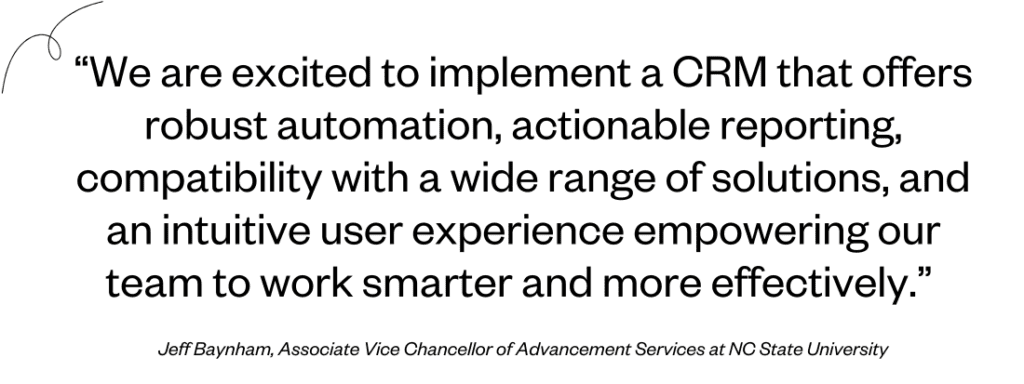
As a senior leader in Advancement Services, you have a major role in providing mission-critical support to your institution’s fundraising and alumni engagement teams. You want to empower your fundraising teams to succeed in building relationships and securing the resources your institution needs to thrive. One of the most effective ways to support their efforts is by providing them with the tools and data they need to do their jobs effectively and efficiently. You need a modern, robust fundraising CRM to be the engine driving a strategic and successful advancement operation.
How to know you’ve outgrown your legacy CRM
When you are so used to your CRM system, it can be easy to become desensitized to its issues. You end up having a ton of workarounds and systems to try to make it do what you need it to do. Here are some telltale signs that it is time to upgrade:
Aging/sunsetting existing platform
As technology evolves, older CRM systems often struggle to keep up with the growing demands of higher education institutions. Legacy platforms may become increasingly difficult to maintain and update, leaving your team vulnerable to security risks and technical glitches. With many older CRM systems no longer receiving regular updates or support, sticking with a sunsetting platform can hinder your institution’s ability to innovate and adapt to changing fundraising expectations. Transitioning to a more modern CRM can mitigate these risks, ensuring you have a reliable, scalable system that will continue to support your institution’s needs for years to come.
Lacks modern features and UI
A CRM that lacks modern features and a user-friendly interface can create significant inefficiencies for your advancement team. With outdated designs and clunky navigation, your team may spend more time on manual tasks and troubleshooting than on engaging with alumni and donors. Modern CRMs offer intuitive dashboards, automation tools, and advanced analytics that streamline processes and improve user experience. By switching to a platform with a contemporary UI and robust functionality, your team can work more efficiently, boosting productivity and engagement while reducing frustration.
Use of multiple platforms to fulfill needs
Many higher education institutions find themselves juggling multiple platforms to meet their CRM needs. This piecemeal approach can lead to data silos, duplication of efforts, and an overall lack of coherence in your outreach strategies. For example, one system may handle admissions while another manages alumni relations, and yet another tracks donations. A unified CRM solution can consolidate all these functions into one platform, offering seamless integration and a 360-degree view of your stakeholders. This not only improves communication across departments but also simplifies reporting and decision-making.
Inefficient and delayed data feeds
A common frustration with older CRM systems is the inefficient and delayed data feeds that hinder timely decision-making. When data isn’t synced in real-time, your team may be working with outdated information, which can lead to missed opportunities or inaccurate targeting. For example, enrollment data, donor information, and communication history may be out of sync, making it difficult to personalize outreach or assess trends. Modern CRMs offer real-time data integration and automation, allowing for faster, more accurate insights that enable your team to act on up-to-date information and make more informed decisions.
Unable to support an upcoming campaign
With an important campaign on the horizon—whether it’s a fundraising initiative, recruitment drive, or alumni engagement effort—the last thing you want is to be held back by an inefficient or outdated CRM. A modern CRM can provide the tools you need to target the right audience, track engagement, and manage relationships more effectively. It can also offer powerful segmentation, personalized messaging, and analytics to help ensure the success of your campaign. By switching to a more advanced platform ahead of time, you’ll position your institution to achieve its goals more efficiently and successfully.
Benefits of switching to a new CRM
So what is to gain when you move to a new, modern CRM? Here are some of top reasons you should make it a priority, that will ultimately lead to elevating your fundraising and advancement efforts:
Seamless integration for smarter giving and alumni engagement
Your alumni and donors expect a smooth, intuitive online experience. With a modern CRM, integration with your alumni portal and online giving pages becomes seamless, offering faster processing with more accuracy. This means fewer errors, happier donors, and more efficient gift processing (elimination of manual entry) for your team. For fundraisers, this integration ensures that data from online giving flows directly into the CRM, reducing delays. The result? Fundraising professionals can focus on building relationships and engagement with their donors.
Enhanced data quality through improved integrity and governance
In today’s data-driven world, having clean, reliable data isn’t optional—it’s essential. A new CRM aligned with campus-wide data integrity and governance rules and standards ensures that the fundraising team is working with accurate, up-to-date information.
This impacts everything from prospect research to donor stewardship. When fundraisers and alumni engagement officers can trust the data they’re using, they can craft better proposals, send more personalized communications, and foster stronger connections with donors.
Advanced security for donor data
Protecting donor information is non-negotiable. A modern CRM provides the highest levels of data security, ensuring compliance with evolving regulations and safeguarding sensitive donor records from potential breaches. For fundraising teams, this peace of mind translates into stronger donor confidence. When donors know their information is secure, they’re more likely to continue supporting the institution generously.
Powerful reporting and dashboards to drive strategic action
Gone are the days of waiting weeks (or dare I say months) for custom reports. Today’s CRMs put powerful reporting and analytics tools directly in the hands of fundraisers, empowering them to speak to the right donor at the right time with the right message. Whether it’s tracking campaign progress, identifying trends, or analyzing donor behavior, the ability to access real-time dashboards ensures that every member of the team is equipped to act strategically and proactively.
CRM switch success story
Jeff Baynham, Associate Vice Chancellor of Advancement Services at NC State University and his team recently made the decision to switch to a new CRM (the best one, in our opinion). Their old system was not performing to the standard they needed, and the upgrade had become essential, “Our technology ecosystem was outdated, inefficient, and stretched to its limits. We had to rely on multiple platforms because our core database simply couldn’t meet our needs, resulting in inefficient lagging data feeds and users having to operate in multiple systems daily. It was clear we needed to transition to a modern CRM.”
Jeff is looking forward to a number of benefits from upgrading their system:
- Ability to merge multiple platforms to single source of truth, streamlining their entire process
- Increased staff productivity through the use of automation
- Robust data and analytics to guide their decisions as a team
- Ability to use a self-service reporting system
- Increase in fundraising outcomes (the number of gifts, average gift size, increase in donor retention, etc.)
“We are excited to implement a CRM that offers robust automation, actionable reporting, compatibility with a wide range of solutions, and an intuitive user experience empowering our team to work smarter and more effectively,” says Jeff.

Challenges in upgrading your CRM
Making the switch to an upgraded CRM is not always an easy decision. It’s very common to have some resistance to change from team members, even if the end results will make their work life that much easier. There are a few common pain points that pop up in the decision process:
Common fears and resistance to a CRM switch
Switching CRMs can trigger significant resistance within an organization, especially when employees have grown comfortable with an existing system, even if it’s outdated or inefficient. The emotional and cultural barriers to change can be strong—many team members may fear disruption, loss of control, or the uncertainty of adopting something new.
The familiar old system, despite its limitations, offers a sense of stability. A shift to a new platform can feel like a risk, especially if there’s apprehension about learning how to use unfamiliar tools or the fear that the transition won’t go smoothly. Overcoming this resistance requires strong leadership, clear communication, and a focus on how the new system will ultimately improve workflows, reduce pain points, and support long-term institutional goals.
Complexity of CRM features
One of the most frequent concerns when considering a CRM switch is the perceived complexity of the new platform’s features. With more modern CRMs offering a wide array of advanced capabilities—like automation, AI-driven insights, and highly customizable workflows—it’s easy to worry that these features will be overwhelming for your team to learn or navigate.
However, it’s important to recognize that these features are designed to streamline processes, not complicate them. While there may be a learning curve, investing in training and selecting a CRM with an intuitive user interface can significantly reduce this concern. When implemented correctly, a new CRM should simplify daily tasks, reduce manual effort, and improve overall efficiency. By highlighting these long-term benefits during the planning phase, you can help ease the team’s concerns about complexity and ensure they see the full potential of the new system.
Fear of data migration and integration challenges
Data migration and integration are often the most daunting aspects of a CRM switch. The idea of transferring large volumes of sensitive and complex data—such as student records, donor information, or alumni interactions—from an old system to a new one can be overwhelming. Fears of data corruption, loss, or inconsistencies are common, and the thought of having to manually correct or restore data is a significant deterrent for many institutions. However, with careful planning, this process can be streamlined.
A well-executed data migration strategy, supported by a dedicated team and the right tools, will ensure that your institution’s data is safely and accurately transferred. Thorough testing and validation at each step can help minimize errors, and backup systems can protect against any unforeseen issues. By addressing these concerns upfront and investing in expert assistance, the migration process becomes much less intimidating, allowing your team to focus on leveraging the new CRM’s capabilities.
The bottom line: A new CRM is an investment in success
As advancement professionals, we know that your ability to fundraise effectively hinges on the tools you use. A modern CRM isn’t just a technology upgrade—it’s a strategic investment in your team’s ability to build relationships, inspire generosity, and achieve your institution’s mission and goals.
If you’re on the fence about upgrading, consider this: How much more could your team achieve with better integration, cleaner data, stronger security, and real-time insights? It seems, the answer is clear—investing in the right CRM is one of the best ways you can support your fundraising teams and drive success for the entire institution.
If you are looking for more in-depth information about next steps in switching to a new CRM, check out our blog, How to Create a CRM RFP (it’s more similar to a capital campaign than you think).
Be the first to read our resources.
The world is changing quickly—and our resources help you stay on top of it all. Sign up to get new insights, success stories, and more, sent right to your inbox.



